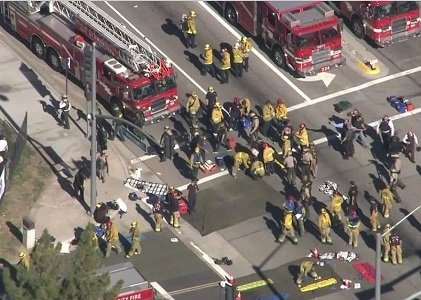Surely some uber-conservative political candidates will call me out on “politicizing tragedy” but I don’t care. I don’t want to pray for victims. I don’t want to seek vengeance on perpetrators. I want this never to happen again; I want to never feel this weight again.
Not just something but so many things must be done. My heart is so heavy to learn of not one but two mass shootings in the United States today. While the news is focused on
San Bernadino, California, as I write at least 14 people are dead and 17 seriously injured, another mass shooting occurred earlier in the day on December 2 in Savannah, Georgia.
We have now endured more shootings in 2015 than days in the year. Yes, that’s right— an average of more than one per day.
What do we do? It won’t be easy, that’s for sure. But there are some obvious components, and some other things we need to consider that are rarely part of the public dialogue.
Gun control? Check. We have to create sensible policies that at least make it more difficult for dangerous people to acquire dangerous weapons.
Provide better mental health services? Check. Without a doubt we need to be way better at recognizing who is suffering from mental illness, who among that population might be a threat to themselves or others, and offer supports for them to reduce the chances of horrific violence.
However, in addition to those seemingly obvious answers, we also need to think about what motivates mass shooters in the first place. While some suffer from mental illness, many are simply people who have lost hope, who see themselves as worthless. The above-listed solutions do nothing to address how we change the hearts and minds of people. I don’t profess to have all the answers, nor do I think any one thing is “the” solution, but I do think we need to talk a lot more, and act a lot more, to create a populace that sees violence itself as abhorrent. We need to create a society in which people’s natural instinct for dealing with difficult times is not to pull out a gun or other weapon but rather to seek help and guidance and to use their humanity and creativity to work out another answer.
What I am not hearing much about is the importance of teaching people to think and act differently. We need to teach young people (and every age—it’s never too late!) that they can and have to express how they feel. We need to teach people how to
receive that information and how not to judge but to empathize and support. We need to help people learn how to adapt when things don’t go as planned, and we need to learn to be better cheerleaders for one another. We need to teach people resiliency, as things will likely be challenging at some point and with ample coping skills we can not only survive but thrive. We need to figure out how to help people see a ray of light, a bit of hope, in what can often be perceived as a hopeless situation.
In essence, we need peace education. Everywhere, all the time! Peace education teaches people that not only are there nonviolent ways to resolve conflict but that each one of us is responsible for doing so. It emphasizes that we have to build our capacities for love, acceptance and understanding if we want a better world. Laws and policies can help, but changing the way we think is imperative.
Can we please agree to do this? It’s hard, but also not that hard. Our future seriously depends on it. Another way is possible, people. Let’s make it happen.
Laura Finley, Ph.D., teaches in the Barry University Department of Sociology & Criminology and is syndicated by PeaceVoice.
